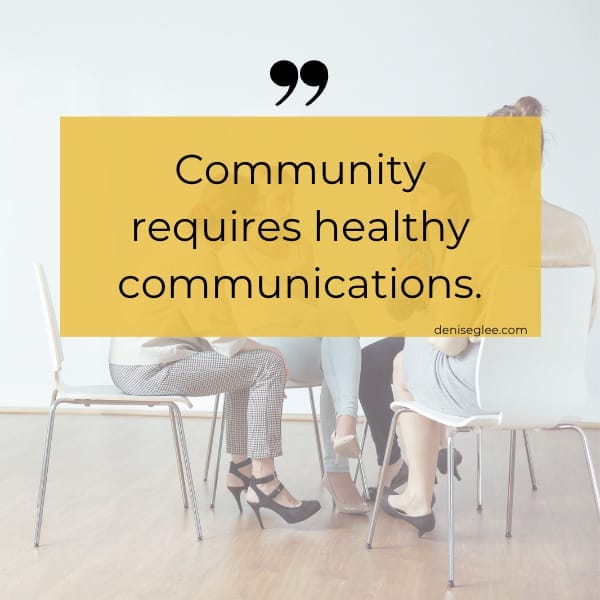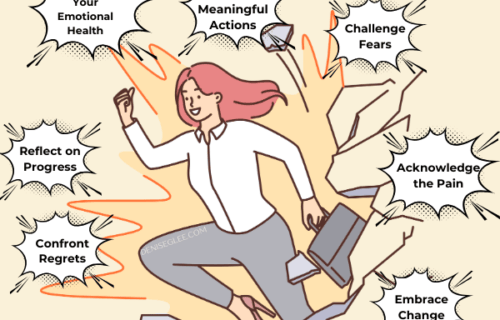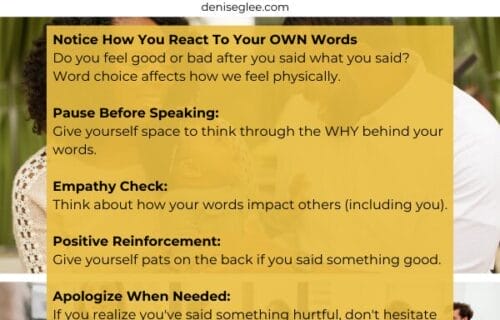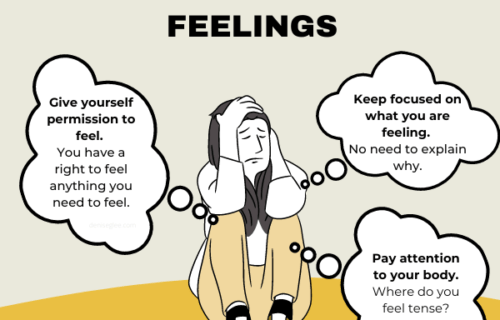
Remove Stress: How You Can Address Conflict with Grace
- Published:
- Updated: April 12, 2024
Imagine a world with no disagreements or opposing views – sounds peaceful in theory, right? In reality, the absence of conflict is a recipe for stagnation. While conflict in personal or professional situations may cause tension or make things a little awkward, it’s an opportunity for growth and broadening of perspective.
But let’s be honest, it’s not easy to handle conflict when emotions on both sides are high. To thrive in different roles, you must recognize that there are healthy and unhealthy ways to address conflict. And choosing the former is always the right choice!
If you’re eager to derive benefits from unavoidable conflicts and work toward positive outcomes, be mindful.
Since conflicts are inevitable, let’s use this as a teaching moment for everyone, including yourself. As a professional life coach, here are my top tips for managing conflict effectively.
Don’t be afraid to ask questions, offer your own, and replay what you hear in your head. A lot of times, inattentive listening leads to selective retention of information, which dilutes the purpose behind what the person speaking to you is seeing.
Denise G. Lee Tweet
Look at the man (or woman) in the mirror
1. Don’t get angry at the messenger
When someone poses an opinion that’s exactly opposite to yours and challenges your worldview, remember that you’re in disagreement with what the other person has to say, not the other person as a whole. In this podcast episode, I talk about how to understand the reasons behind your anger.
Oftentimes, people lose their cool because they can’t separate the opinion from the one giving it. In personal spheres of life, acknowledging that there is a glaring line between the two is essential for lasting relationships. And in the professional realm, this approach ensures that bias doesn’t cloud your judgment.
2. Know that people are allowed to think differently
There’s no logic behind expecting everyone to think the same way. If you find yourself riling up in situations of conflict, it’s somewhat rooted in false entitlement that others should subscribe to your worldview. Sometimes, jealously and envy also impacts our ability to see things clearly.
As someone who wants to put their perspective out there, know that doing so requires that you return the favor to others. In other words, allow others the freedom to think differently. Rest assured, when you do, our word will have greater power to move, influence, and even change someone else’s views.
3. Identify the conflict’s source
Did you know that most conflicts turn into ugly fights when people refuse to identify the source? Conflict resolution is all about understanding where you as well as the other person are coming from.
A little empathetic insight can diffuse the situation while allowing you to find a viable solution. So, before things get too far, make sure to gather your thoughts and dive deep into your feelings – this is the only part you can control so take charge of it.

Listen to learn. Speak to clarify.
4. Listen intently
Understanding the other party’s perspective requires attentive listening. This means that you must truly devote yourself to the conversation at hand, rather than mentally skim through it.
Don’t be afraid to ask questions, offer your own, and replay what you hear in your head. A lot of times, inattentive listening leads to selective retention of information, which dilutes the purpose behind what the person speaking to you is seeing.
5. There are no right and wrong opinions
Besides the big things in life, there are virtually no right and wrong opinions. For instance, if you and your teammate are presented with a goal and they choose option A to achieve it, whereas you lean toward option B – both are viable choices. In any case, the goal will be realized, so then, neither opinion is wrong, just different.

Find win-win, whenever possible.
6. Don’t be defensive
Strong leaders are known for their relentlessness but that doesn’t mean they get defensive in the face of opposition. Blaming others is a surefire way to escalate conflicts that can be easily leveraged for a positive result.
Being defensive makes it hard to find a solution that will work for both parties. This is why you should simply focus on putting your thoughts forward without demeaning or minimizing the other party. If you feel that the other person’s suggestions may lead to negative repercussions, give them valid reasons as to why your recommendation is better.
7. Don’t use ‘you’ phrases
Even if your attention isn’t to assign blame, using ‘you’ statements can make you come across otherwise. For instance, rather than ‘you bringing up such topics always gets me in a bad mood’, say ‘it upsets me when such topics are discussed’.
Here, you’re telling the other person what you emotionally need, without pointing verbal fingers. That, when the listener doesn’t perceive your response as an attack, they become more open to understanding the meaning behind your words.
Honest communication is the key and your only job is to ensure that you’ve spoken your truth. Keep your side of the street clean, and don’t worry about the other's, that’s their responsibility.
Denise G. Lee Tweet
8. Don’t treat compromises like personal losses
Letting your ego get the best of you almost always takes an ugly turn. Understand that you can’t always have your say, and sometimes forgoing little wins for bigger collaborations pays off.
Carefully assess the loss of giving up partial control, and then ask yourself: ‘Is winning the argument really worth risking a budding bond, a business deal, or a relationship?’. If the answer is no, proceed with an open mindset and prepare to meet the opposing party in the middle.
9. Divorce yourselves from the outcome of the request
Thinking too much about the possible outcome skews our judgment, and compels us to conceal the truth. This is possibly the worst thing you can do for yourself as well as the other person.
Remember, honest communication is the key and your only job is to ensure that you’ve spoken your truth. Keep your side of the street clean, and don’t worry about the other’s, that’s their responsibility.
10. Self-reflect after the conflict is over
Perhaps you didn’t react in the best way during a conflicting situation. Don’t bash yourself, self-reflect instead. Think about what you could have done better and hold on tight to the lessons you learn. Self-reflection is practiced by those who realize success is a journey, not a destination. And that should be your goal too.
If you haven’t done so already, check out my podcast. Almost every episode contains questions to assist you in this process.
11. Let a life coach guide you
Due to past and current traumas, you might be stuck resorting to maladaptive ways of approaching conflict. No matter how hard you try, anger gets the best of you.
Rest assured, this doesn’t mean you can’t improve, simply that you need an extra hand to manage your emotional burden and navigate healthy methods of conflict resolution. Let’s work together so that you can heal your inner child, work toward becoming the best version of yourself, and get in deeper touch with your feelings.
And if you haven’t done so already, check out my top rated business and life podcast. It is full of helpful tips to improve your mindset.






Add A Comment
You must be logged in to post a comment.